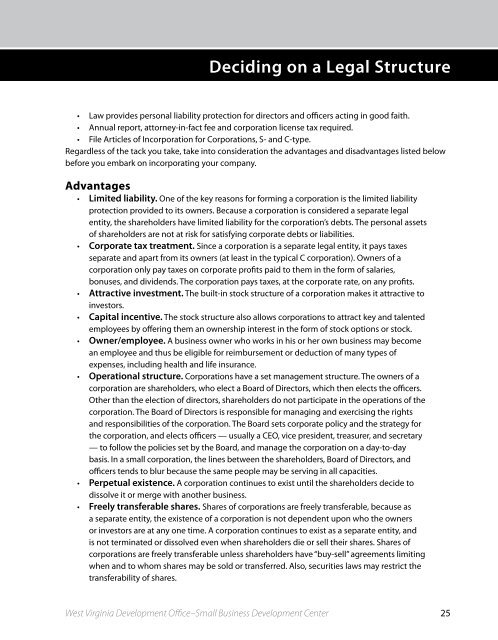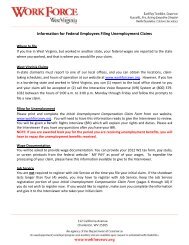Going Into Business in West Virginia - West Virginia Department of ...
Going Into Business in West Virginia - West Virginia Department of ...
Going Into Business in West Virginia - West Virginia Department of ...
Create successful ePaper yourself
Turn your PDF publications into a flip-book with our unique Google optimized e-Paper software.
Decid<strong>in</strong>g on a Legal Structure<br />
• Law provides personal liability protection for directors and <strong>of</strong>ficers act<strong>in</strong>g <strong>in</strong> good faith.<br />
• Annual report, attorney-<strong>in</strong>-fact fee and corporation license tax required.<br />
• File Articles <strong>of</strong> Incorporation for Corporations, S- and C-type.<br />
Regardless <strong>of</strong> the tack you take, take <strong>in</strong>to consideration the advantages and disadvantages listed below<br />
before you embark on <strong>in</strong>corporat<strong>in</strong>g your company.<br />
Advantages<br />
• Limited liability. One <strong>of</strong> the key reasons for form<strong>in</strong>g a corporation is the limited liability<br />
protection provided to its owners. Because a corporation is considered a separate legal<br />
entity, the shareholders have limited liability for the corporation’s debts. The personal assets<br />
<strong>of</strong> shareholders are not at risk for satisfy<strong>in</strong>g corporate debts or liabilities.<br />
• Corporate tax treatment. S<strong>in</strong>ce a corporation is a separate legal entity, it pays taxes<br />
separate and apart from its owners (at least <strong>in</strong> the typical C corporation). Owners <strong>of</strong> a<br />
corporation only pay taxes on corporate pr<strong>of</strong>its paid to them <strong>in</strong> the form <strong>of</strong> salaries,<br />
bonuses, and dividends. The corporation pays taxes, at the corporate rate, on any pr<strong>of</strong>its.<br />
• Attractive <strong>in</strong>vestment. The built-<strong>in</strong> stock structure <strong>of</strong> a corporation makes it attractive to<br />
<strong>in</strong>vestors.<br />
• Capital <strong>in</strong>centive. The stock structure also allows corporations to attract key and talented<br />
employees by <strong>of</strong>fer<strong>in</strong>g them an ownership <strong>in</strong>terest <strong>in</strong> the form <strong>of</strong> stock options or stock.<br />
• Owner/employee. A bus<strong>in</strong>ess owner who works <strong>in</strong> his or her own bus<strong>in</strong>ess may become<br />
an employee and thus be eligible for reimbursement or deduction <strong>of</strong> many types <strong>of</strong><br />
expenses, <strong>in</strong>clud<strong>in</strong>g health and life <strong>in</strong>surance.<br />
• Operational structure. Corporations have a set management structure. The owners <strong>of</strong> a<br />
corporation are shareholders, who elect a Board <strong>of</strong> Directors, which then elects the <strong>of</strong>ficers.<br />
Other than the election <strong>of</strong> directors, shareholders do not participate <strong>in</strong> the operations <strong>of</strong> the<br />
corporation. The Board <strong>of</strong> Directors is responsible for manag<strong>in</strong>g and exercis<strong>in</strong>g the rights<br />
and responsibilities <strong>of</strong> the corporation. The Board sets corporate policy and the strategy for<br />
the corporation, and elects <strong>of</strong>ficers — usually a CEO, vice president, treasurer, and secretary<br />
— to follow the policies set by the Board, and manage the corporation on a day-to-day<br />
basis. In a small corporation, the l<strong>in</strong>es between the shareholders, Board <strong>of</strong> Directors, and<br />
<strong>of</strong>ficers tends to blur because the same people may be serv<strong>in</strong>g <strong>in</strong> all capacities.<br />
• Perpetual existence. A corporation cont<strong>in</strong>ues to exist until the shareholders decide to<br />
dissolve it or merge with another bus<strong>in</strong>ess.<br />
• Freely transferable shares. Shares <strong>of</strong> corporations are freely transferable, because as<br />
a separate entity, the existence <strong>of</strong> a corporation is not dependent upon who the owners<br />
or <strong>in</strong>vestors are at any one time. A corporation cont<strong>in</strong>ues to exist as a separate entity, and<br />
is not term<strong>in</strong>ated or dissolved even when shareholders die or sell their shares. Shares <strong>of</strong><br />
corporations are freely transferable unless shareholders have “buy-sell” agreements limit<strong>in</strong>g<br />
when and to whom shares may be sold or transferred. Also, securities laws may restrict the<br />
transferability <strong>of</strong> shares.<br />
<strong>West</strong> Virg<strong>in</strong>ia Development Office–Small <strong>Bus<strong>in</strong>ess</strong> Development Center 25

















